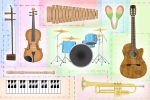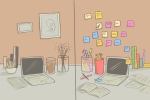I used to beg my mother for piano lessons. Many of my sisters danced and I wanted to understand the feeling of grace that I assumed they felt on stage. I never did feel the grace of dancing on stage, though not from a lack of recitals. I had difficulty remembering dance routines and I did not like sitting still through practice. I wanted to dance after all.
It seemed I, a young child with ADHD, would never feel graceful. Or so I had thought. Learning a musical instrument opened doors I had never imagined; it calmed me and gave me the encouragement I needed to pursue new opportunities.
Music offers a form of solace we can all appreciate. However, the calamity of music is not always appealing. But for neurodivergent people, the chaos of using both hands, reading sheet upon sheet of a different language and skipping from one end of the instrument to the other can be the best part of music.
Playing an instrument is a stimulating, hands-on activity. It requires a person to listen and be patient. Those with disabilities, especially those with ADHD and autism, often have trouble sitting still and listening to directions. But instruments offer physical stimulation and the reward of learning a song. This can appeal to a desire for gratification for a person with disabilities.
Even if you cannot play a song right away, you can still play notes, you can hit multiple keys or strum multiple chords. A dance routine must be flawless, but there is no need to be perfect when learning an instrument. Learning to play in your own time is especially rewarding. An instrument is a positive way to improve pattern recognition, concentration and self-image. These are just a few of the various benefits for disabled musicians.
I was enthralled with the piano from a young age. I did not care if I played a song or a note; I was happy to make sounds and see that I could create something. I loved to be creative, but I had difficulty working with numbers and memorization. Learning the notes of a piano and how to read them was a great way for me to improve my processing skills.
A recent study by Neuroscience News says music enhances learning through neuroplasticity. Nina Kraus, lead author of the Nature perspective, the Hugh Knowles Professor of Communication Sciences and Neurobiology and director of Northwestern’s Auditory Neuroscience Laboratory, confirmed these reports.
“The brain is unable to process all of the available sensory information from second to second, and thus must selectively enhance what is relevant,” Kraus said. Playing an instrument primes the brain to choose what is relevant in a complex process that may involve reading or remembering a score, timing issues and coordination with other musicians.
Instruments are also a good source of stimuli when used properly, meaning the person will not be overwhelmed. What makes stimuli so important to neurodivergent people is it can easily tip on a scale. For me, this means pleasant sounds and relaxing music increase my mood as I imagine it does with most people.
https://www.instagram.com/p/B5o5ch_Buew/?utm_source=ig_web_copy_link
But stimuli involves a precarious balance. Too much stimuli — anything from wet clothes to sharp, sudden sounds — is overwhelming. Learning an instrument provides the unique opportunity to control the stimuli around you.
While learning an instrument is helpful for everyone, it offers significant benefits for those with disabilities. Some that are positively impacted by learning an instrument include cognitive disabilities, speech and language impairments, attention deficit hyperactive disorders and learning disabilities, emotional and behavioral disorders and orthopedics and physical impairments.
According to Sally Writes, “This is particularly true when it comes to percussion instruments that require attention to rhythms, such as the piano or drums.”
A common issue with neurodivergent people is a difficulty or fascination with organizing. Music education helps those with special needs establish a greater sense of logic and organization. After all, a musician requires proper pattern recognition when playing an instrument. This practice also exercises a child’s ability to process sound. Audio processing disorder is a subset of ADHD.
According to Gemm Learning, Auditory Processing Disorder (APD) is a condition that affects a child’s ability to process and understand the meaning of the sounds they hear: “Though scientists don’t fully understand the many ways music helps auditory processing and other cognitive skills, they theorize that listening to music in childhood lays down a neural scaffolding, or framework from which other, similar abilities can grow.”
Though APD applies to speech learning, an instrument can even help those with APD. When playing an instrument, you must focus on the sound you’re hearing. Is the note too high? Did the sound come in too early? Processing and interpreting sounds are an important part of any person’s life. With an instrument, the person must concentrate on understanding the instrument and sound coming from it.
Writes encourages choosing an instrument with swift motions. “Studies have shown that choosing a musical instrument that requires swift motions (i.e. guitar, trombone, violin, drums) improves motor skills and multitasking skills,” she said. “In addition to paying attention to their motions, they must also concentrate on the music that’s produced.”
With YouTube, downloadable instruments and various formats to learn to play an instrument, now is a great time to go online and see what you can find. Its important to remember that learning an instrument takes time and practice.
I have been playing the piano for four years now and even if I’m not in lessons it’s a great way for me to practice all kinds of processing skills and to just have fun. Mastering the guitar or the piano takes time. But with just one key you can make a sound. And from there? The sky is the limit.
















